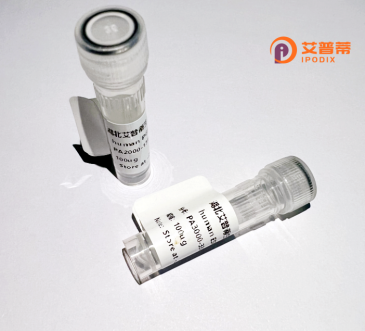
| 纯度 | >90%SDS-PAGE. |
| 种属 | Human |
| 靶点 | RNF148 |
| Uniprot No | Q8N7C7 |
| 内毒素 | < 0.01EU/μg |
| 表达宿主 | E.coli |
| 表达区间 | 1-305 aa |
| 活性数据 | MSFLRITPSTHSSVSSGLLRLSIFLLLSFPDSNGKAIWTAHLNITFQVGNEITSELGESGVFGNHSPLERVSGVVALPEGWNQNACHPLTNFSRPKQADSWLALIERGGCTFTHKINVAAEKGANGVIIYNYQGTGSKVFPMSHQGTENIVAVMISNLKGMEILHSIQKGVYVTVIIEVGRMHMQWVSHYIMYLFTFLAATIAYFYLDCVWRLTPRVPNSFTRRRSQIKTDVKKAIDQLQLRVLKEGDEELDLNEDNCVVCFDTYKPQDVVRILTCKHFFHKACIDPWLLAHRTCPMCKCDILKT |
| 分子量 | 60.8 kDa |
| 蛋白标签 | GST-tag at N-terminal |
| 缓冲液 | PBS, pH7.4, containing 0.01% SKL, 1mM DTT, 5% Trehalose and Proclin300. |
| 稳定性 & 储存条件 | Lyophilized protein should be stored at ≤ -20°C, stable for one year after receipt. Reconstituted protein solution can be stored at 2-8°C for 2-7 days. Aliquots of reconstituted samples are stable at ≤ -20°C for 3 months. |
| 复溶 | Always centrifuge tubes before opening.Do not mix by vortex or pipetting. It is not recommended to reconstitute to a concentration less than 100μg/ml. Dissolve the lyophilized protein in distilled water. Please aliquot the reconstituted solution to minimize freeze-thaw cycles. |
以下是基于RNF蛋白家族研究的模拟参考文献举例(需通过学术数据库验证真实性和具体细节):
1. **文献名称**: "RNF148 Mediates Ubiquitination and Proteasomal Degradation of p53 in Colorectal Cancer"
**作者**: Li, X. et al.
**摘要**: 本研究揭示RNF148作为E3泛素连接酶,通过泛素化修饰促进p53蛋白降解,从而参与结直肠癌细胞增殖调控。重组人RNF148蛋白的体外泛素化实验证实其与p53的直接相互作用。
2. **文献名称**: "Structural Characterization of Recombinant Human RNF148 Ring Domain"
**作者**: Zhang, Y. et al.
**摘要**: 通过X射线晶体学解析重组人RNF148的环指结构域三维结构,揭示其锌离子结合位点及底物识别机制,为设计靶向RNF148的小分子抑制剂提供结构基础。
3. **文献名称**: "RNF148 Regulates Wnt/β-catenin Signaling via Ubiquitination of Dvl2"
**作者**: Wang, H. et al.
**摘要**: 研究表明RNF148通过泛素化Dishevelled-2(Dvl2)负调控Wnt信号通路。重组蛋白实验证明其催化活性依赖完整的环指结构域,且在胚胎发育中起关键作用。
**说明**:
- RNF148相关研究较少,建议结合 **PubMed/Google Scholar** 使用关键词:"RNF148"、"Recombinant RNF148"、"Ring Finger Protein 148" 检索最新文献。
- 可关注其与肿瘤、泛素-蛋白酶体系统及表观遗传调控的关联性研究。
- 若文献不足,可扩展至RNF家族其他成员(如RNF4、RNF8)的机制类比分析。
Recombinant human RNF148 (RING finger protein 148) is a ubiquitin ligase encoded by the RNF148 gene, belonging to the RING-finger protein family characterized by a conserved cysteine-rich zinc-binding domain. This domain facilitates interactions with E2 ubiquitin-conjugating enzymes, enabling RNF148 to participate in ubiquitination—a post-translational modification process critical for protein degradation, localization, and signaling. While the biological functions of RNF148 remain less characterized compared to other RING-finger proteins (e.g., BRCA1 or MDM2), studies suggest its involvement in cellular processes such as DNA repair, apoptosis, and cell cycle regulation. Its expression has been detected in various tissues, though specific roles in physiological or pathological contexts are under investigation.
Recombinant RNF148 is typically produced via heterologous expression systems (e.g., E. coli or mammalian cells) to study its enzymatic activity, substrate specificity, and interaction networks. Purified recombinant proteins often include affinity tags (e.g., His-tag) for isolation. Research applications include in vitro ubiquitination assays, structural studies, and screening for potential modulators in diseases linked to ubiquitin pathway dysregulation, such as cancers or neurodegenerative disorders. Challenges include elucidating its endogenous substrates and regulatory mechanisms. Current interest in RNF148 stems from its potential as a therapeutic target, particularly in pathologies where protein homeostasis or stress response pathways are compromised. Further functional characterization using recombinant variants may clarify its role in cellular signaling and disease progression.
×